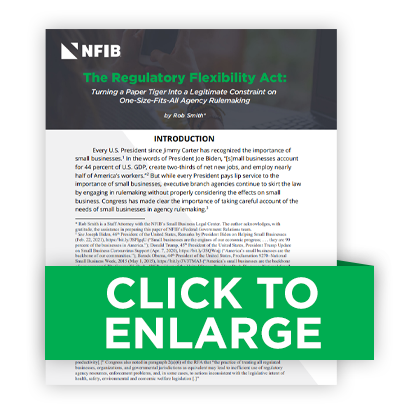Topics:
May 17, 2023
Strengthening the Regulatory Flexibility Act is crucial for small business
How Congress Can Reduce the Regulatory Burden on Small Business
 The Regulatory Flexibility Act (RFA), unanimously passed by Congress in 1980, was enacted to protect small businesses from one-size-fits-all rulemaking by federal agencies. Unfortunately, federal agencies routinely ignore the RFA’s requirements throughout the rulemaking process. NFIB’s Manager of Federal Government Relations Josh McLeod wrote an op-ed for the Washington Times about how Congress can give small businesses relief from costly and complicated regulations by strengthening the RFA.
“The RFA was initially successful, leading to a 16% decrease in final rules and a 28% decline in proposed rules in its first year. Yet agencies have since discovered they can treat the law as a formality. The result has been an explosion of costly mandates and red tape. For instance, between January 2021 to March 2023, the Biden administration imposed almost $360 billion in regulatory costs and added more than 220 million hours of paperwork burdens,” Josh wrote.
The RFA is supposed to protect small businesses by requiring agencies to:
The Regulatory Flexibility Act (RFA), unanimously passed by Congress in 1980, was enacted to protect small businesses from one-size-fits-all rulemaking by federal agencies. Unfortunately, federal agencies routinely ignore the RFA’s requirements throughout the rulemaking process. NFIB’s Manager of Federal Government Relations Josh McLeod wrote an op-ed for the Washington Times about how Congress can give small businesses relief from costly and complicated regulations by strengthening the RFA.
“The RFA was initially successful, leading to a 16% decrease in final rules and a 28% decline in proposed rules in its first year. Yet agencies have since discovered they can treat the law as a formality. The result has been an explosion of costly mandates and red tape. For instance, between January 2021 to March 2023, the Biden administration imposed almost $360 billion in regulatory costs and added more than 220 million hours of paperwork burdens,” Josh wrote.
The RFA is supposed to protect small businesses by requiring agencies to:
- analyze a regulation’s effects on small businesses
- consider ways to ease compliance for small businesses, including alternatives and exemptions
- solicit direct input from small businesses through formal panels, before finalizing rules
Get to know NFIB
NFIB is a member-driven organization advocating on behalf of small and independent businesses nationwide.
Related Articles

June 30, 2025
NFIB Slams MA Legislature for Slipping New “Secure Choice…
“Again, lawmakers’ policy choices and pro-small-business rhetoric are in…
Read More


June 30, 2025
Get Tips on Website ADA Compliance on the Small Business Rundow…
The Small Business Rundown talks website ADA compliance, the Small Business…
Read More


June 30, 2025
NFIB Survey Sheds Light on New Technologies for Small Business
NFIB’s Small Business and Technology Survey shows how small businesses ar…
Read More


June 30, 2025
Small Businesses Pick Up Promising Wins in U.S. Supreme Court�…
The Supreme Court’s 2024-2025 term was a relatively quiet one for small b…
Read More







